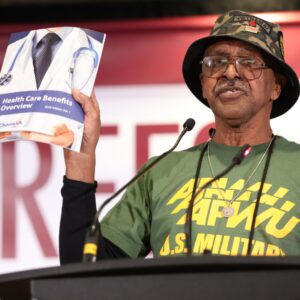July 24, 2018
Hearing Loss
Twenty percent of Americans report some degree of hearing loss but those who serve are far more impacted by auditory disorders than the general public due to their exposure to artillery gunfire, battlefield explosives, loud machinery, aircraft noise and traumatic brain injuries (TBIs). Hearing loss and tinnitus, a perceived ringing in the ear that often accompanies it, are the top two service-connected disabilities afflicting service members and generations of veterans. These maladies are often overshadowed by other challenges our service men and women face.
In 2016, the Department of Veterans Affairs (VA) reported, more than 1.6 million veterans received disability compensation benefits for tinnitus, and another 1.1 million received monthly payments for hearing loss. A staggering 60 percent of the troops who returned home from Iraq and Afghanistan sustained some degree of hearing loss, causing the military to take preemptive measures to curtail hearing loss.
These statistics also prompted the VA to recognize the importance of connecting veterans, friends and family with resources that promote understanding and ultimately provide solutions.
Tinnitus and CAPD
There are two types of tinnitus: subjective, when only the sufferer can hear the sound in their head or ear when no external noise is present; and objective, when crackling or clicking inside the middle ear can be heard by others. Both forms can be slight to severe, occur intermittently or constantly. For some it is a nuisance, for others, like those experiencing hearing loss, it can be life altering.
In addition to being disproportionately affected by tinnitus and hearing loss, military members and veterans are more susceptible to developing central auditory processing disorders (CAPD), which is similarly caused by exposure to loud noise, percussion and TBIs. Individuals with CAPD can hear sounds but are unable to understand spoken words. Auditory conditions intertwine physically and emotionally – as a trigger, a consistent reminder or a daily frustration that creates unique and personal challenges for veterans. According to the VA, left untreated hearing loss and other auditory disorders can lead to harmful health.
Hearing Loss effects such as cardiovascular disease, diabetes and dementia; cause social, psychological, and cognitive issues that can negatively impact work and personal life; and potentially lead to isolation and depression.
Solutions
Fortunately, there are a variety of options available to veterans who have or suspect they have hearing-related issues. Local VA medical centers and community partners offer screening, treatment and/or management services for varying degrees of hearing loss, tinnitus, CAPD and balance disorders.
Some forms of hearing loss, such as those that affect the middle ear, can be successfully treated with surgery. Alternatively, where damage to the inner ear and auditory nerve cause permanent hearing loss, modern technologies such as discreet hearing aids, TV and telephone amplifiers, and auditory implants can optimize residual hearing by amplifying sounds. Assistive/alerting devices and service animals can also prove helpful.
Although there is no specific cure for tinnitus, doctors are often able to find and eliminate the underlying cause. Many patients have had improvements with medicine, sound therapy and the use of white-noise machines. Others have benefited from controlled counseling exercises that focus on increasing relaxation and improving circulation to alleviate tinnitus. Some research suggests tinnitus can be induced or aggravated by stress, anxiety, fatigue and other external factors, making cognitive behavioral therapy a viable treatment choice.
Seeking evaluation may seem daunting but taking this initial step through the VA, or a preferred ear, nose and throat specialist, can connect veterans with successful treatment options and other services offered through community partners to meet their needs.
To apply for service-connected disability benefits associated with auditory disorders or to be scheduled with an auditory specialist, visit www.ebenefits.va.gov. To discover other free and discounted resources, visit the solutions page found at www.heroeswithhearingloss.org. – Human Relations Department


